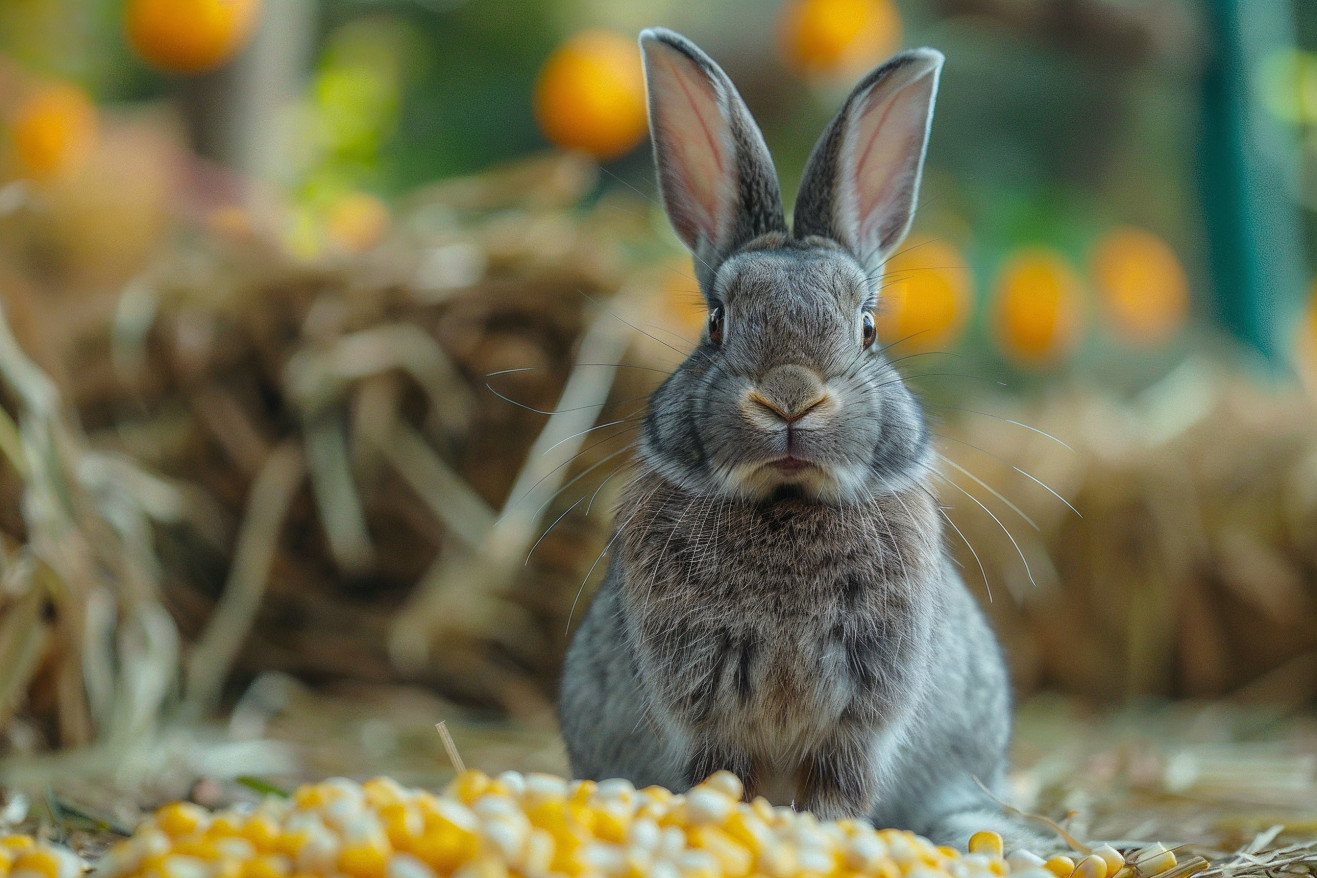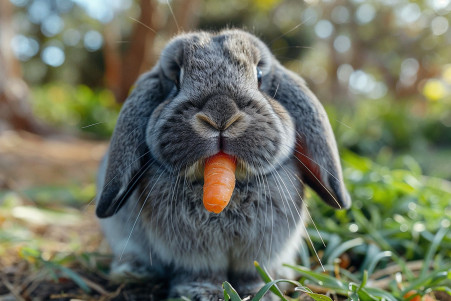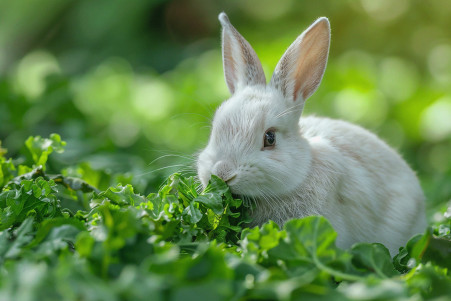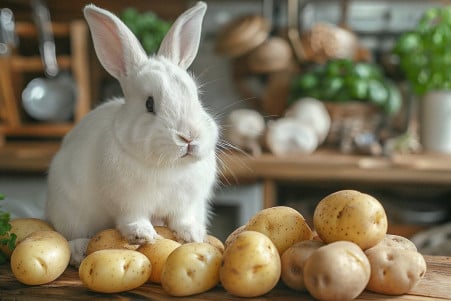Can Rabbits Eat Corn? Understanding Rabbit Dietary Needs
22 February 2024 • Updated 22 February 2024

Corn: a dietary staple for humans, but is it safe for rabbits to eat? While rabbits can eat corn, it is not recommended by veterinarians due to its high sugar and starch content, which can lead to digestive issues and obesity. Instead, rabbits should be fed a diet of hay, leafy greens, and rabbit-safe fruits and vegetables in moderation.
This article will use veterinary information and nutritional research to explain the effects of corn on a rabbit’s diet. Topics will include a summary of studies on rabbit gut health, the effects of different nutrients on rabbits, and recommendations from experts on what rabbits should eat.
By examining the scientific research on the sugar and starch content of the foods rabbits eat, this article will help you better understand how to make the best choices for your pet’s diet.
Can rabbits eat corn?
The Rabbit’s Specialized Digestive System
The rabbit’s digestive system is specialized to break down a high-fiber diet through hindgut fermentation. According to VCA Animal Hospitals, the cecum is similar to that of a horse and contains a microbial community that ferments fibrous plant material. Purina Animal Nutrition’s study shows that high-quality fiber is necessary to support these microbes, which are important for rabbit digestion and gut health.
On the other hand, rabbits are intolerant of high-sugar and high-starch diets, which can lead to digestive issues. The Merck Veterinary Manual suggests that high-sugar and high-starch diets can suppress the release of motilin, a hormone that helps stimulate gastrointestinal motility. This can lead to conditions like GI stasis, a potentially fatal condition in rabbits.
In addition, the rabbit’s practice of coprophagy, or eating cecotropes, is important for nutrient absorption, as it ensures that rabbits get the vitamins and amino acids that are produced during cecal fermentation. Foods like corn, which don’t meet the rabbit’s need for a high-fiber diet, can disrupt this balance. This raises the question of what health problems these foods may cause our rabbit friends.
Why Corn Is Bad for Rabbits
While corn may seem like a harmless addition to a rabbit’s diet, the high sugar and starch content can lead to a number of health issues. The hulls of corn kernels, which rabbits cannot digest, can cause intestinal blockages and lacerations, which can be particularly dangerous for a rabbit’s sensitive digestive system, according to Rabbits.life.
The lack of nutritional value in corn also increases the risk of gastrointestinal problems, including GI stasis, which is a common issue in rabbits and can be life-threatening.
In addition to the risks associated with the nutritional content of corn, the physical form of the food also poses a number of dangers. For example, Dr. Jess from Vet Explains Pets points out that corn cobs can be a choking hazard and can cause gastrointestinal obstruction if swallowed. Rabbits are also at risk of becoming obese, especially if they are fed a diet that includes high-calorie, low-nutrient foods like corn.
If a rabbit shows signs of bloating or constipation after eating corn, it’s important to get them to a vet right away. It’s also worth noting that while corn stalks and husks can be fed to rabbits in moderation, they also pose risks and should be given to rabbits with caution.
With that in mind, it’s important to understand the nutritional needs of rabbits and how to meet them to ensure that they are healthy and happy.
What Does a Healthy Diet Look Like for a Rabbit?
To ensure your rabbit is getting the nutrition it needs, it’s important to make sure that you are feeding it a variety of hays, vegetables, and a small amount of pellets.
As the RSPCA notes, a rabbit’s diet should be made up mostly of good-quality hay or grass, which should be available at all times to help with digestion. Not only does hay help grind down a rabbit’s teeth, which grow continuously, but it also provides most of the fiber that rabbits need in their diet.
Vegetables are also important and should make up a large part of a rabbit’s diet. According to Rabbit.org, fresh greens should make up about 10% of a rabbit’s diet, and there should be a variety of options to make sure that the rabbit is getting a range of nutrients.
When it comes to pellets, make sure that they are high in fiber and make up less than 5% of the diet, and focus on the quality of the pellets, not the quantity.
When it comes to treats, including fruit, they should be fed in moderation. Best Friends Animal Society suggests that treats should be limited to small amounts once or twice a week because they are high in sugar. It’s also important to avoid muesli-style foods, which can cause health problems, and if you need to change your rabbit’s diet, make sure to do it slowly to give their digestive system time to adjust.
Make sure to adjust the amount of food you are feeding your rabbit to make sure that they are maintaining a healthy weight, as both underweight and overweight rabbits can experience health problems. Keep an eye on your rabbit’s health by paying attention to their eating habits and the consistency of their droppings to make sure that you are keeping up with their overall health.
This well-rounded approach to nutrition sets the stage for a conversation about how a healthy diet contributes to a rabbit’s overall health and longevity.
Impact of Diet on Rabbit Health and Lifespan
Studies have shown that diet is one of the most important factors in a rabbit’s health and lifespan. For example, a study in the Journal of Animal Science found that rabbits need high-fiber diets to maintain good gut health and also warned that high-starch diets can lead to enteritis, or inflammation of the small intestine.
Meanwhile, another study in Animals found that things like Moringa oleifera leaf extract can have a positive impact on rabbit metabolism and reproductive performance, showing that plant-based supplements have a number of benefits.
It’s important to make sure that dietary fiber is balanced with the right amount of fat to support a rabbit’s growth and nutrient retention. For example, a study in Animals found that increasing the fat content in a rabbit’s diet can increase nitrogen retention and reduce nitrogen excretion, which is good for overall health.
On the other hand, imbalanced diets, especially those that are high in starch and sugar, can lead to a number of health problems, including obesity and gut issues.
By making sure that rabbits get a balanced diet that includes plenty of fiber and the right kinds of fat, rabbit owners can help improve their pets’ health and support a longer, healthier life. This makes it important to understand the role of diet composition, which not only impacts rabbits’ health in the short term but also their long-term well-being.
How to Make Sure Your Rabbit Has a Healthy Diet: A Realistic Guide for Pet Owners
It is important to make sure that your rabbit has a well-balanced diet. The RSPCA says that fresh water should always be available and that it should be offered in a sturdy ceramic bowl to prevent spills. They also stress the importance of providing good quality hay, like Timothy or Meadow hay, which should be available at all times and in an amount that is at least the size of the rabbit.
The RSPCA recommends that new foods should be introduced slowly and in small amounts to avoid upsetting your rabbit’s digestive system. They also say that an adult-sized handful of mixed leafy greens, with a mix of 5–6 different types, should be offered every day. When it comes to treats, they say that non-corn options like carrots and apples are safe in moderation but should be given carefully because of their high sugar content.
Make sure that you take your rabbit to the vet regularly for personalized dietary recommendations because every rabbit has different nutritional needs. Also, make sure that you keep an eye on your rabbit’s health by watching its eating patterns and its droppings, as any changes could be a sign of a health problem.
By doing this, you can make sure that your rabbit is eating a diet that will help it stay healthy and strong, which is part of the bigger picture of understanding what your rabbit needs to thrive.
Final Thoughts: Feeding Your Rabbit for a Long, Healthy Life
In summary, while rabbits can eat corn, it’s not recommended because of the potential health problems. The high sugar and starch content of corn can lead to serious health issues, such as obesity and digestive problems, in rabbits. Instead, rabbit owners should focus on a diet that’s high in hay, with a variety of vegetables and a limited amount of pellets.
We’ve covered the unique nature of rabbit digestion, the problems with corn, and the best nutritional profile for these wonderful animals. As their caregivers, it’s up to us to make sure that their diet is as close to their natural diet as possible, which means high fiber, low sugar, and moderate protein and fat.
This article is a good reminder of how important diet is to the health and lifespan of rabbits. We encourage you to continue to learn and get advice from veterinarians about how to care for rabbits. By making sure that they get the right nutrition, we can help them live long, happy lives that are full of health and energy.


